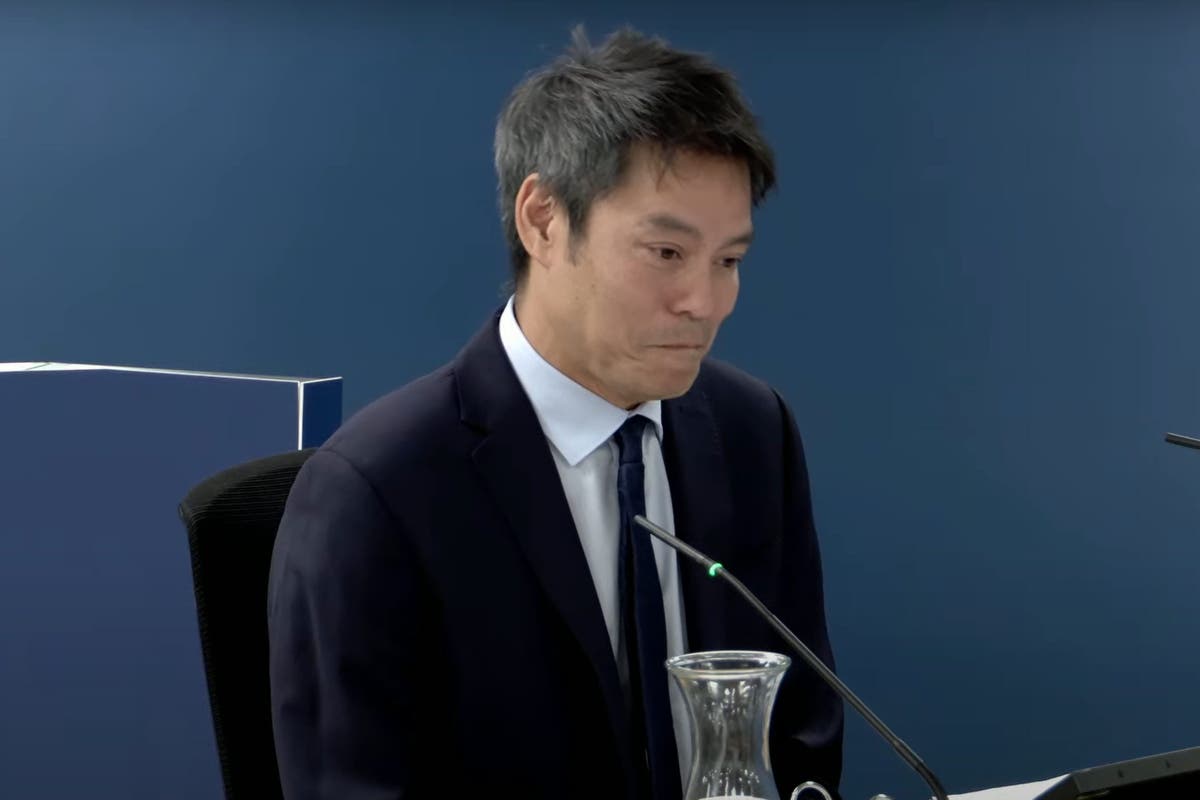Politicians chose not to equip the UK with enough intensive care units before the pandemic the chief medical officer has said, as a senior NHS doctor described scenes “from hell” on hospital wards.
Professor Kevin Fong – former national clinical adviser in emergency preparedness, resilience and response at NHS England – told the Covid-19 inquiry he was on the scene of the Soho bombing in 1999 and worked in A&E during the July 7 London bombings “but nothing that I saw… was as bad as Covid was every single day” for the hospitals most badly hit during the pandemic.”
Describing the hospitals he visited during the pandemic the medic said staff were so overwhelmed hospitals ran out of body bags and had sick patients “raining from the sky”.
The current module of the Covid-19 inquiry will focus on the NHS’s role and handling during the pandemic.

Also on Thursday, Professor Sir Chris Whitty, medical chief medical officer for England, told the inquiry: “The UK has a very low ICU (intensive care unit) capacity compared to most of our peer nations in high-income countries.
“Now that’s a choice, that’s a political choice. It’s a system configuration choice but it is a choice. Therefore you have less reserve when a major emergency happens, even if it’s short of something of the scale of Covid.”
He said that while beds and space can be bought, systems could not be “scaled up” without trained workers.
“There is no way you can train someone in six weeks to have the experience of an experienced ICU nurse or an experienced ICU doctor. It is simply not possible,” he said.
Asked about long Covid, Prof Whitty said it was “inevitable” that some people would suffer long-term effects.
England’s chief medical officer said it was “much less predictable” that people who had mild or moderate disease would suffer long-term effects.
Prof Whitty said the messaging around the different masks healthcare workers should use during the pandemic was “quite confused” at the beginning of the pandemic.
He added: “I think the reason that it was confused was it was not entirely clear who was ultimately responsible for making decisions in this fast-moving situation. I think that quite a lot of people thought they were partially responsible, and that’s always an extremely difficult and dangerous situation to find yourself in.”
When asked about messaging to the public over the long-term effects, Prof Whitty said: “I worried at the beginning, I still worry, actually, in retrospect, about: did we get the level of concern right?
“Were we either over-pitching it so that people were incredibly afraid of something where, in fact, their actuarial risk was low or would be not pitching it enough, and therefore people didn’t realise the risk they were walking into? I think that balance is really hard.”
Putting people in body bags
Prof Fong said said the “scale of death was truly, truly astounding”.
“I worked on a shift where we had six deaths in a single shift,” he said. “Another hospital told us that they had 10 deaths on a shift, two of whom were their own staff.
“We had nurses talking about patients raining from the sky, where one of the nurses told me they just got tired of putting people in body bags.”
“(One hospital) said that sometimes they were so overwhelmed that they were putting patients in body bags, lifting them from the bed, putting them on the floor, and putting another patient in that bed straight away because there wasn’t time.
“We went to another hospital where things got so bad, they were so short of resource, that they ran out of body bags, and they were instead issued with 9ft clear plastic sacks and cable ties.”
He said the nurses talk about being traumatised by the experience describing “recurring nightmares about feeling like they were just throwing bodies away.”
In one hospital, nurses took to wearing adult nappies because they were so stretched they could not take toilet breaks. Others went to Screw Fix to buy visors for their own protective equipment, the inquiry heard.
“I’ll never forget it,” he said. “It was a scene from hell.
“There were so few staff that some of the nurses had chosen to either use the patient commodes in the side rooms, and some of the nurses had chosen to wear adult diapers because there was literally no one to give them a toilet break and take over their nursing duties.”
He recalled a doctor in another unit who told him, “‘It’s been like a terrorist attack every day since it started, and we don’t know when the attacks are going to stop’.”

Prof Fong said the experience for NHS staff on the front line in intensive care was “indescribable” and there were units where 70 per cent of patients died.
Prof Fong told how one patient died in an ambulance because they could not get into the hospital, while other patients could not be intubated as there was no room or staff and ICU was full.
“It’s genuinely the closest I’ve ever seen a hospital to a state of collapse in my entire career,” he said.
The anaesthetist at University College London Hospitals NHS Foundation Trust, who was seconded to NHS England in March 2020, told the UK Covid-19 Public Inquiry that a colleague at a district general hospital contacted him in the early days of the crisis to tell him they were “overflowing with patients”.
He was told that the hospital was “running out of staff and running out of basic consumable items” including drugs and equipment.
Several people in the public seating area at the inquiry wiped away tears during Prof Fong’s testimony.








